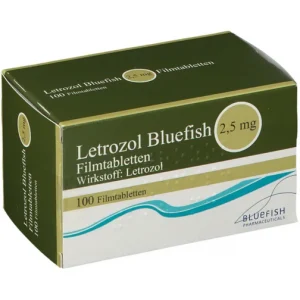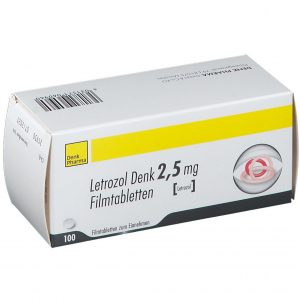Description
Pharmacodynamics
Letrozole has anti-estrogenic action, selectively inhibits aromatase (enzyme of estrogen synthesis) by highly specific competitive binding to the subunit of this enzyme – cytochrome P450 gene. It blocks estrogen synthesis in both peripheral and tumour tissues.
In postmenopausal women, estrogens are formed mainly with the participation of the aromatase enzyme, which converts androgens synthesised in the adrenal glands (primarily androstenedione and testosterone) into estrone and estradiol.
Daily administration of letrozole in a daily dose of 0.1-5 mg leads to a decrease in the concentration of estradiol, estrone and estrone sulfate in plasma by 75-95% of the initial content. Suppression of estrogen synthesis is maintained throughout the treatment period.
When using letrozole in the dose range from 0.1 to 5 mg, no disturbance of steroid hormone synthesis in the adrenal glands is observed, the test with adrenocorticotropic hormone (ACTH) does not reveal any disturbance of aldosterone or cortisol synthesis. Additional administration of glucocorticosteroids and mineralocorticosteroids is not required.
Blockade of estrogen biosynthesis does not lead to accumulation of androgens, which are estrogen precursors. Against the background of letrozole administration, no changes in plasma concentrations of luteinising and follicle-stimulating hormones, changes in thyroid function, changes in lipid profile, increased incidence of myocardial infarctions and strokes were observed.
Against the background of letrozole treatment, the incidence of osteoporosis slightly increased (6.9% compared to 5.5% on placebo). However, the incidence of bone fractures in patients receiving letrozole does not differ from that in healthy people of the same age.
Adjuvant therapy with letrozole for early-stage breast cancer reduces the risk of recurrence, increases 5-year disease-free survival, and reduces the risk of secondary tumours.
Extended adjuvant therapy with letrozole reduces the risk of recurrence by 42%. A significant benefit in disease-free survival in the letrozole group was observed regardless of lymph node involvement. Letrozole treatment reduced mortality in patients with lymph node involvement by 40%. Extended adjuvant therapy with letrozole after 5 years of tamoxifen therapy resulted in a significant reduction in the risk of progression and development of contralateral breast cancer compared to placebo.






Reviews
There are no reviews yet.